Syria, officially known as the Syrian Arab Republic, is a country located in the Middle East. However, due to the ongoing conflict in the region, the political situation in Syria has been complex and volatile. It’s important to note that the information provided here is based on the situation as of my knowledge cutoff in September 2021, and there may have been significant developments since then. Here are some key points about the political system in Syria:
- Governance: Syria is officially a presidential republic, with the President serving as both the head of state and the head of government. The President is elected through a popular vote, although the elections have been criticized for lack of transparency and fairness.
- Ba’ath Party: The Ba’ath Party has been the ruling political party in Syria since 1963. The party follows a socialist Arab nationalist ideology and plays a significant role in the political landscape of the country.
- State Institutions: The Syrian government consists of various state institutions, including the Council of Ministers, which is the executive body responsible for implementing government policies. The People’s Council (Majlis al-Sha’ab) is the unicameral parliament, and members are elected through elections. However, it’s important to note that the political landscape in Syria has been heavily influenced by the ongoing civil war and the control of different factions over certain territories.
- Conflict and Opposition: Since 2011, Syria has been embroiled in a devastating civil war, which has resulted in significant political, social, and humanitarian consequences. The conflict involves various actors, including the Syrian government, opposition groups, extremist organizations, and international powers. The opposition groups have sought political change and have established their own governing bodies in parts of the country.
- International Involvement: The conflict in Syria has drawn significant international attention and involvement. Various countries have supported different factions, leading to a complex geopolitical situation. Additionally, international efforts have been made to facilitate negotiations and find a political solution to the conflict, although progress has been limited.



